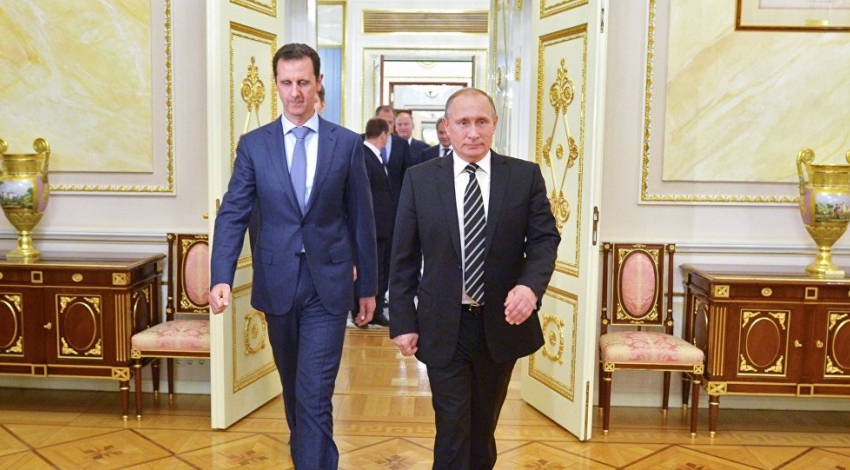Thursday 22 October 2015 - 09:47
Story Code : 185408
Assad-Putin talks open way to ceasefire in Syria
WASHINGTON (Sputnik)�� Syrian President Bashar Assad�s visit to�Moscow and talks with�Russian President Vladimir Putin opens the way at�last for�a negotiated political solution to�the Syrian civil war, US experts told Sputnik.
�There has always been, through�the UN-sponsored Geneva process, a good opportunity to�resolve Syria's crisis through�diplomacy and negotiation,� Helena Cobban, author of�two books on�the geopolitics of�Syria, told Sputnik on�Wednesday.
Previously, that road to�a compromise solution was blocked by�the Obama administration�s insistence that Assad must be toppled from�power first, Cobban recalled.
However, �This was always a patently ridiculous stand, and an expression of�the �regime change� agenda for�Syria that has deep roots in�the Washington political class,� she said.
If the international community had insisted on�toppling President Frederik de Klerk before�starting any meaningful negotiation, �We would still have apartheid and war in�South Africa today,� she noted.
Cobban pointed out�that Assad continues to�hold strong support among�ordinary Syrians.
The Syrian elements supported by�Washington, Cobban added, revealed themselves to�be even weaker and more factionalized than�the conventional wisdom in�the US capital had previously allowed.
�[A]t least now, after�the two developments of�the collapse of�the Pentagon's arm-and-train program and the strengthening of�the Russian and Iranian deployments in�Syria, there is a new opportunity for�negotiations. Most especially since�Washington has eased up�on its �Assad must go� stance,� she stated.
Moscow has taken some steps to�try and identify, work with�and empower non-Ba�ath elements who can be involved in�the negotiation, Cobban explained.
By contrast, �Washington has made so many attempts to�put together a single, coherent �opposition coalition�, under�various ever-changing names, that the situation would be hilarious if it were not so terribly tragic for�Syria's people,� Cobban asserted.
The most feasible short-term prospect could be establishing a broad ceasefire in�Syria before�winter sets in, the expert said.
Cobban also suggested that the United Nations could issue a call for�a ceasefire followed by�the Syrian government, the United States, Russia, Turkey, Jordan, and the European Union.
�To launch this process, UN Secretary General Ban [Ki-moon] should be encouraged to�travel to�Damascus, Amman and Ankara,� she concluded.
Colonel Doug Macgregor, a retired US Army combat officer, published author and expert on�Middle East conflicts, suggested that Washington might adopt the ceasefire idea because the United States did not have any key interests at�stake in�the Syrian conflict.
�Washington has no strategy because its interests in�the Sunni-Shia conflict are marginal at�best. The Obama Administration�s current political goal is to�be seen by�campaign donors and voters as �engaged� in�the region at�least through�the presidential election,� Macgregor told Sputnik.
However, that level of�interest did not translate into�a tangible, concrete objective, let alone useful action, Macgregor noted.
By Sputnik News
# Tags











